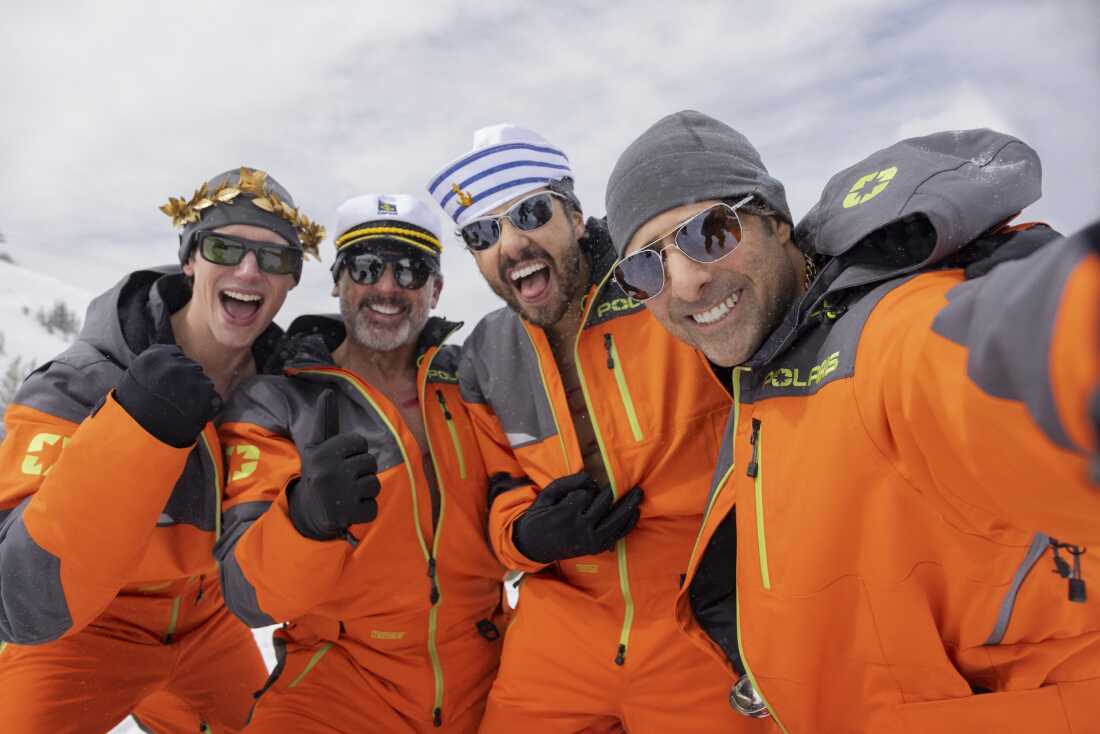
Cory Michael Smith, left, Steve Carell, Ramy Youssef and Jason Schwartzman star in HBO’s Mountainhead.
Fred Hayes/HBO
hide caption
toggle caption
Fred Hayes/HBO
The new film Mountainhead, written and directed by Succession creator Jesse Armstrong, is about the super-rich, so people may expect something Succession-ish: a tragedy studded with dark humor. Instead, in the tradition of Armstrong’s work on the British series The Thick of It and the film In the Loop, Mountainhead is a comedy — a bleak, brutal comedy, but a comedy nonetheless.
The action unfolds at the titular mountain mansion newly built by Hugo (Jason Schwartzman), a millionaire hundreds of times over who is trying to figure out how to take his meditation app to the next level. Hugo — whose friends call him “Souper” for reasons that will be uncovered — has invited three billionaire buddies for what’s ostensibly a poker weekend: Venis (Cory Michael Smith), a social media titan casually referenced as the richest man in the world; Jeff (Ramy Youssef), a rival to Venis with a powerful AI company; and Randy (Steve Carell), a venture capitalist who has just received some bad health news that he has decided not to believe.
As the men arrive at Mountainhead, they see online that the new generative AI features in Venis’ social media app have led to global mass violence as fake videos bait people into conflict and panic. Economies are beginning to collapse. As all four men take in the potential downfall of civilization on their phones, they’re not sure how worried to be. Jeff is against all the death and suffering, but he also sees opportunity. See, Jeff’s AI technology has the ability to distinguish truth from fiction, meaning he has the cure to the disease Ven has unleashed. Ven wants to buy his company, but Jeff isn’t inclined to sell. After all, the more desperate the world grows, the more valuable Jeff’s product might become. For him, it makes sense to get as close to the apocalypse as possible before he cashes in.
While the four men at Mountainhead are targets of Armstrong’s withering stink-eye for their amoral, antisocial approaches to the world — less fiddling while Rome burns than doing molly and scheming to corner the market on fire extinguishers — the stake he drives through their hearts is how unremarkable they are in every way except that they are rich.
Hugo is a grasping coward. Venis is a vain, foolish, unloved dweeb who is probably also a sociopath. Randy is a bloviating, self-important tangle of resentments who fancies himself an intellectual but believes immortality is five years away and can’t boil an egg. Playing Jeff, Youssef is the only one of these actors whose natural charisma is allowed to fly free. Jeff is, if you will, the Roman Roy of this enterprise — the character who is obviously also a terrible person, but whose capacity for humor keeps making you wish he weren’t. And even he, in the end, is an insecure and awkward poser who couldn’t read a room with a book light and a magnifying glass.
Perhaps it’s unsurprising that in the hands of a terrific writer of comedy, a terrible sense of humor marks characters as untrustworthy and dull. In the opening moments of the film, Ven is in a big SUV with a couple of his lead sycophants, and he chuckles at the fact that he posted about his product launch with one word — “F***” — but he accidentally spelled it with two u’s. He thinks it’s hilarious that he wrote it with two u’s, and the members of his team say they agree. He should leave it like that, they all say. It’s hilarious. Two u’s! Ven is blissfully unaware — and he probably wouldn’t care — that everyone is lying to him, just as he is later blissfully unaware that everyone at Mountainhead is talking behind his back about how weird he’s getting as the worldwide chaos expands and the pressure on him to stop it grows.
Ven, Randy and Hugo are all devoid of wit at an atomic level, greedily slurping up cursory chuckles at their shriveled one-liners. They sometimes take a smidgen of true pleasure in cruelty or vulgarity, or in the fact that being trapped with people who believe it’s financially advantageous to laugh at their jokes is the closest thing they experience to friendship. But they have no charm, only money. Armstrong is pitch-perfect at writing weak jokes for great comic actors so that, for instance, Steve Carell is very funny even though Randy is hopelessly, painfully not. More than once, you may find yourself thinking that Randy, minus his money, is a close relative of Michael Scott.
Eventually, a divide between Jeff and the other three men forms and then deepens, mostly because Ven is angry at Jeff for not selling to him, and Randy and Hugo are attached to Ven like parasites desperate to get promoted from barnacle to tapeworm. This divide takes a dark turn that sends the whole thing into farce and slapstick, as it turns out that these particular masters of the universe, for all their bravado, wouldn’t have the fortitude to push over a trash can without outsourcing it to an underpaid permatemp.
At times, Mountainhead‘s bleakness will take your breath away. The dangers of losing our hold on reality come to the forefront both because of the central storyline about AI and because these men are so fully cleaved from the rest of humanity that they might as well already be living on Mars the way they dream of doing.
During one conversation, Ven asks Randy, “Do you believe in other people?” He isn’t asking whether Randy believes in the goodness of other people, or whether he trusts other people. He’s asking whether Randy believes in other people — skeptically questioning that there can really be “eight billion people as real as us.” The tentacles of a quasi-spiritual denial of reality already are wrapped around Ven’s ankles, and that’s part of why he takes in scenes of death and destruction on the internet with a shrug. When he says those scenes on his app aren’t real, he means the videos might be AI. But he also seems to mean that those things aren’t real, because they aren’t happening to him. They’re happening to 8 billion other human beings who are such abstractions that he’s beginning to think they don’t exist, or at least they don’t exist in the same way he does.
There might be hope that Ven will get better at some point, but the keenest observation in Mountainhead is that all of these men pose the same threat, which is that as the world changes rapidly and their power expands exponentially, they never learn anything. They can’t. They can’t learn from experiencing consequences, because their money means they never do. They can’t learn from other people, because nobody they listen to is willing to tell them the truth. They can’t learn from history, because they believe they belong to a special class of superhumans to whom the rules of history do not apply. And traditional learning has been a bust: Even though they are superficially educated, these guys possess no insight. Randy loves to cite tidbits of history and philosophy, but he doesn’t understand any of them.
On the one hand, Mountainhead is just a despairing wail into the sky. After all, however foolish they may be, however little they know, these guys have the power they have and the money they have and the attendant ability to do harm, and there are no obvious solutions to that (other than perhaps a well-timed avalanche). Their world is stuck with them.
On the other, watching a writer as skilled as Armstrong create these characters with such queasy believability and then poke them in the eye over and over again for almost two hours is profoundly pleasurable. After all, the point of “The Emperor’s New Clothes” was less that it’s shameful to be naked and more that it’s shameful — and funny — to be a dope. It may not be obvious how to take power back from people who shouldn’t have it, but the least we can do, Armstrong demonstrates, is to see them for what they are with clear eyes, and to refuse to pretend they are anything else.
This piece also appeared in NPR’s Pop Culture Happy Hour newsletter. Sign up for the newsletter so you don’t miss the next one, plus get weekly recommendations about what’s making us happy.
Listen to Pop Culture Happy Hour on Apple Podcasts and Spotify.















